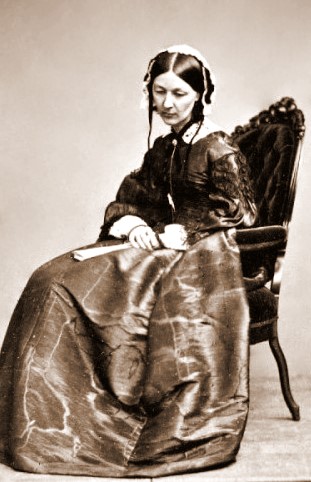Florence Nightingale, like Thomas Wakley, is a great medical hero, but not someone I’d invite to a dinner party.

Florence Nightingale c1856
Nightingale was born into an upper-class family in 1820. Her father gave her a man’s education of science and maths and she rebelled against a woman’s role in life. But then she decided that god wanted her to be a nurse. Her family were horrified. At that time nurses were seen as dirty, drunken, ignorant women. But Nightingale managed to receive some training abroad and became superintendent at a medical institute on Harley Street.
When the Crimean war broke out, the British public were shocked by reports of the dreadful conditions endured by wounded soldiers. Politician Sidney Herbert sent Nightingale and a team of volunteer nurses to sort things out. The mission was vital to the war, the continuance of the British government, and Nightingale’s career.

Florence Nightingale receiving the wounded at Scutari by Jerry Barrett
The Crimean hospital was a death camp, with ten times as many soldiers dying from infectious diseases as from wounds. But Nightingale had a formidable capacity for leadership and a steely determination to get things done. She supplied enough towels, soap, cooking equipment and food for hundreds of men. Her nurses cleaned the filthy wards. Eventually a Sanitary Commission arrived from England to clean out the sewers and improve ventilation, and the death rate finally dropped.
This was a huge propaganda victory for the government, and Nightingale achieved overnight fame. The Times called her ‘the lady with the lamp’ after her night-time hospital rounds. The romantic myth of the lovely, dedicated, self-sacrificing nurse was born. Funding poured in, which Nightingale later used to set up a nursing school.

Nightingale in Scutari
For many people, that’s where the Nightingale legend ends. But in fact, her really important work didn’t start until she returned to England. She advised on hospital planning, management and design, healthcare and military field hospitals. She instigated a Royal Commission into the health of the army. She advised on the health of the British Army in India and sanitation reforms in British India as a whole. She wrote the classic textbook Notes on Nursing: What It Is and What It Is Not and a further 200 books and pamphlets on nursing and sanitation. She pioneered the use of statistical graphics to convey complex medical information. Indeed, Nightingale became the first female member of the Royal Statistical Society. Honours were heaped on her. After a lifetime of hard work in her chosen field, Nightingale died in 1910, at the age of 90.

Notes on Nursing, by Florence Nightingale
But in 1918 Lytton Strachey published a scathing character assassination of Nightingale in Eminent Victorians and the sentimental Nightingale legend began to slip. In recent years she has been increasingly criticised. Historians have noted that Nightingale’s work in Scutari actually did little to reduce the death rate, and that Nightingale attributed the death rate to poor diet rather than to germs. It was a long time before she embraced the germ theory.
Something that doesn’t endear her to us now is that Nightingale, like many high-flying Victorian women, saw herself as an honorary man, and had little time for women’s rights in general. She was against the women’s suffrage movement and complained that her (upper-class) female relatives were over-feminised to the point of helplessness. Perhaps she had a point, when you consider that she achieved her successes despite being mostly bedridden with a mysterious illness. Many now think it was brucellosis – a parasitic disease causing chronic muscle pain. But some critics suggest it was a psychosomatic ailment, or that she faked illness in order to get her own way.

Florence Nightingale in later years
But why is there so much criticism of Nightingale? And why is some of that criticism so nasty? I think it mainly comes down to good old sexism. Nightingale never married or had children and was probably a lifelong virgin. She was more interested in statistics and politicking than in the hands-on business of caring for people. She gets stereotyped as an unpleasant spinster or a busybody. As a society, we obviously still feel profoundly uncomfortable with women who put work before family or love and aren’t very ‘nice’. It seems a great shame that in 2014 we still can’t celebrate a woman’s achievements without asking, ‘yes but more importantly, was she hot?’ or ‘was she nice?’